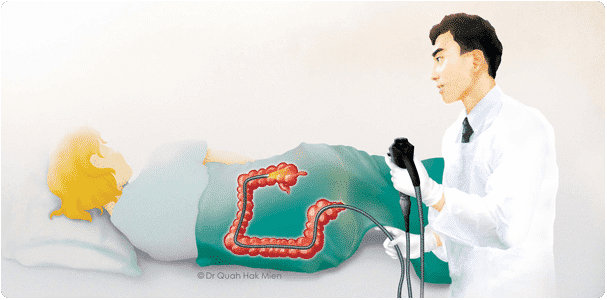What is a colonoscopy?
Colonoscopy is a specialised investigative procedure to evaluate the lining of the colon and rectum directly. It is done in the endoscopy centre. During colonoscopy, a soft flexible telescope camera tube is inserted through the anus and advanced into the rectum and colon.
Why is a colonoscopy performed?
A colonoscopy is usually done as part of routine screening for colorectal cancer or in patients with history of colorectal polyps. It is also performed to evaluate symptoms of bowel problems such as a change in bowel habit or bleeding.
What preparation is required?
The rectum and colon must be completely emptied of stool for the procedure to be performed. Bowel preparation involves taking a special cleansing solution or laxative to clean the colon of stool debris.
The telescope cannot see through stool debris. So any stool debris left in the colon could obscure the identification of a polyp or even a small cancer. A clean colon, cleared of all stools is required, as it improves the accuracy and safety of the procedure. And poor preparation has other consequences during the procedure itself. Firstly, your colonoscopy may last longer because your doctor will need to take time to clear out the debris. Secondly, your doctor may lack the confidence that the colonic lining was seen adequately and may ask you to return for another scope earlier than would normally be recommended. This will subject you to increased costs and risk. Finally, if the preparation is very poor, your doctor may have to stop the procedure entirely, and you will need to reschedule.
You will most likely be given IV sedation during the procedure and an arrangement to have someone take you home afterwards is important. Sedatives will affect your judgement and reflexes for the rest of the day. You should not drive or operate machinery until the next day.
What can be expected during colonoscopy?
Colonoscopy is usually well tolerated. There may be a feeling of pressure, bloatedness or cramping at times during the procedure. Your doctor will give you an injection through a vein to help you relax and better tolerate any discomfort that you may experience. The lining of the colon and rectum is carefully inspected while inserting and withdrawing the scope. The entire procedure usually last for 10 to 30 minutes. In rare situations, the colonoscopy cannot be completed and your doctor could request a barium enema examination.
What if colonoscopy shows an abnormality?
If your doctor sees an area of abnormality that needs more careful evaluation, a biopsy may be taken and submitted to the laboratory for detailed microscopic analysis. Polyps can be removed by using special instruments through the scope. Biopsies do not mean cancer. Removal of polyps essentially prevents the progression of the polyp and development of colorectal cancer.
Can I try colonoscopy without sedation?
Having colonoscopy without sedation has the advantage that you can watch the procedure on the screen and you can get up and walk out immediately after the scope with no restrictions on your activity. Colonoscopy is usually quite easy, causing very little discomfort, but some people have discomfort if they try without sedation. The discomfort might make you less willing to have a colonoscopy in the future and might cause you to say negative things about the colonoscopy to your friends and family, which would in turn make them less willing to have colonoscopy screening that is so important in the prevention of colorectal cancer.
Many endoscopists like me want our patients to be comfortable and to have an easy experience. I do not want to push anyone to try it especially if you are already a little nervous about colonoscopy.
What complications can occur?
Colonoscopy is very safe and complications are rare, with less than 1 in 1000 risk. However, they can occur. They include bleeding from the area of biopsy or polypectomy and a tear (perforation) through the bowel wall. Perforation is a serious complication should it occur, it usually requires abdominal surgery to repair the tear.
It is important to contact your doctor if you notice symptoms of severe abdominal pain, fevers, chills or rectal bleeding of more than one-half cup. Bleeding can occur up to several days after a biopsy.
What happens after colonoscopy?
The results of your colonoscopy will be explained to you after your procedure at the clinic. You may have some mild cramping or bloatedness because of the air pumped in during the procedure to inflate the colon for visualisation. The bloatedness will improve rapidly when the inflated air is extracted after the procedure or when you pass out the residual air naturally. You should be able to eat normally and return to your normal activities after leaving the hospital on the same day.





